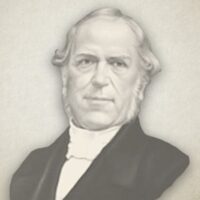
51 ‘“Labor Not For The Meat Which Perisheth, But For That Meat Which Endureth Unto Everlasting Life”
“Labor not for the meat which perisheth, but for that meat which endureth to eternal life,” John 6:27. This text has been considered as undeniable authority for universal invitations of all men to labor for eternal life, and also that it is their duty to do so. This text can never, any more than any other, be an authority for what it does not mean, and for what the speaker did not intend it. And that this text was never spoken with such an intention, I hope, for the sweet harmony of divine truth, to be able to shew, upon undeniable and even on fairly unquestionable grounds. These words were spoken to those Jews who were at this time seekers of Jesus, both by sea and by land; and such was their zeal, that neither distance, dry land, nor sea, could stop them, verse 24. But they sought him merely because ‘they did eat of the loaves, and were filled,’ verse 11,12,26; and as they were now only wanting to do the like again, to ‘serve not the Lord, but their own belly,’ Rom 16:18; and so they would have made him their bread king, their belly being their God, Phil 3:19; and Christ was, with all their zeal and running after him, to be only a sort of high priest of this, their devotion, to the old lust of their flesh, Psalm 78:18,30. And in the words of our text, our Lord rebuked their low and base carnality, in so running after him, in a manner altogether contrary to every thing that belonged to his character as the Messiah of their own prophets, whom they professed to believe, and also as the promised Saviour of the chosen of God; and he rebuked them in the first, while he explained and pointed out to them the latter, with its greater importance; shewing them all through the chapter, what his true character, work and authority really is, and what is indeed the true bread, meat and drink; but which doctrine of truth they could not bear, verse 60; whereas, had he preached the doctrine of duty for eternal life, we know, as they were in sentiment all for works, they would have received that doctrine, though they would never do the duty, because that is human nature’s own darling divinity, and what the carnal world will and do receive, and duty faith and universal invitations just go to serve this taste; and our present contention is, whether there be any authority from God to serve that fruitless, ungodly taste, which in its very root, nature, being, and dwelling place, as in the flesh only, is opposed to the truth of the grace of God. Let us observe,
John Foreman (1792-1872) was a Strict and Particular Baptist preacher. He was appointed the Pastor of Hill Street Chapel, Marylebone, serving this position for close to forty years.
JOHN FOREMAN'S LIFE AND MINISTRY
JOHN FOREMAN ON DUTY FAITH (COMPLETE)
JOHN FOREMAN'S BAPTISM AND COMMUNION CONSIDERED (COMPLETE)




